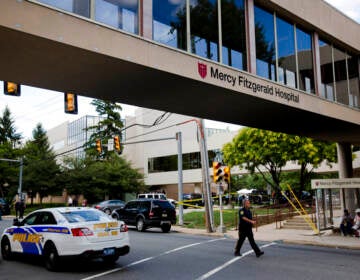Regulator cites failures at hospital where 3 preemies died
The hospital routinely failed to sanitize the equipment it used to prepare donor breast milk, according to a state health department report released Monday.

Geisinger Medical Center in Danville, Pa. (Google Maps)
A major Pennsylvania hospital where three premature infants died in a bacterial outbreak last year routinely failed to sanitize the equipment it used to prepare donor breast milk, according to a state health department report released Monday.
Health department staff ordered Geisinger Medical Center in Danville to correct several deficiencies, determining the hospital’s systemic failure to prevent infection in its most vulnerable patients constituted “immediate jeopardy” — a legal finding that means Geisinger placed its patients at risk of serious injury or death.
Geisinger had previously acknowledged the process it was using to prepare donor breast milk led to the deadly outbreak in the hospital’s neonatal intensive care unit. It has since changed the way it stores and prepares human milk and noted there have been no new cases of infection.
A total of eight premature infants at Geisinger tested positive for the Pseudomonas bacterium between July 1 and Sept. 29, according to the health department’s report. Subsequent investigation found Pseudomonas in a cylinder used to prepare donor breast milk, on a brush used to clean the cylinder, and in breast milk that had been given to an infant who died Sept. 30, the report said.
Pseudomonas bacteria are common and often harmless but can pose a health risk in fragile patients.
The surprise state inspection, which was was conducted in October, found the hospital failed to keep donor breast milk at the correct temperature; did not routinely test equipment for bacteria; stored equipment within the “splash zone” of a sink; and had no written policy for routine cleaning of cylinders, brushes, blenders and other equipment used to prepare breast milk and infant formula.
The health agency’s report cited a “systemic nature of non-compliance with regards to infection control.”
Matt Casey, who represents the families of two of the babies who died, said Monday the inspection uncovered “serious and shocking deficiencies, even worse than already understood.” He continued: “This is an institution that holds itself out as a facility that has specific expertise in caring for premature babies, and this report demonstrates that there was a flagrant disregard of the most basic infection control policies.”
After conducting follow-up inspections and finding the hospital to be in compliance, the health department cleared Geisinger to resume normal operations in the neonatal intensive unit on Dec. 6.
Geisinger, which operates one of Pennsylvania’s largest health networks, had been sending very premature newborns and some expectant mothers to other facilities during the investigation into the outbreak, but said Monday it is now accepting them again. It has repeatedly apologized to the families.
“The teams at Geisinger Medical Center look forward to providing high-quality, life-saving care to our communities’ most fragile infants,” the hospital said in a statement.
WHYY is your source for fact-based, in-depth journalism and information. As a nonprofit organization, we rely on financial support from readers like you. Please give today.




